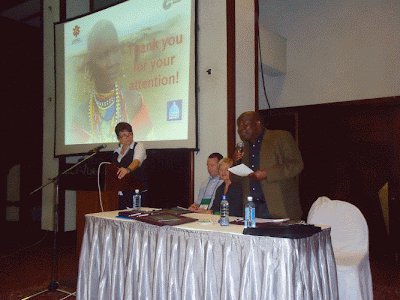 |
| Books in a public library |
Public libraries in most countries in Africa are top on the list of the most neglected public institutions. Most public libraries are under-funded, stocked with old and sometimes out-dated publications (the only latest publications being daily newspapers), lack access to modern information and communication technologies (ICTs), and their staff lag behind in current developments and techniques in information and knowledge management. With this type of profile, is there a future for public libraries in Africa?
Discussions at the first ever African Public Libraries Summit (APLS) 2012, held at Indaba Hotel in Johannesburg, South Africa, 19–21 September 2012, revealed that while some public libraries are almost on stand still, others are making good progress by being innovative and adopting modern ICTs. A good case was presented from Botswana.
 |
| Ms Ruth B. Maphorisa |
Ms. Ruth B. Maphorisa, Permanent Secretary, Ministry of Youth, Sport and Culture, Botswana, shared the experience of her government’s
Sesigo - Botswana e-Public Libraries project. Under the project, public libraries in the country are providing access to computers, computer training and internet access to Batswana. The libraries are also providing space for homework clubs, health talks, lifeline youth meetings, unemployment workshops and training sessions, book reading clubs, English learning sessions and talk shows involving professionals from different fields including health, education and social welfare. The project is being implemented by her Ministry in collaboration with the Bill and Melinda Gates Foundation through the African Comprehensive HIV/AIDS Partnerships (ACHAP).
 |
| Ms. Magdeline Engleton |
Ms. Magdeline Engleton, Senior Library Officer, Botswana National Library Service, based Molalatau Village Library, shared her experience in running and providing information and library services to rural communities. Her library engages with community members to identify their needs, and gets them involved in the Library activities. She is providing computer training, Internet services, and helping the youths in the community to search for jobs. These services, which are beyond the traditional public libraries’ services, are attracting community members to the Library.
Although external international organizations are involved in the working in the Sesigo - Botswana e-Public Libraries project, it was clear from the discussions that the success of the initiative is largely because of the Government’s commitment and support to public libraries. The Permanent Secretary participating in the entire three-day meeting, which focused on public libraries, is proof of this support.
What is the status of public libraries in other African countries? Do they have a future? Will they end up like the extinct dinosaur?
About 127 delegates attended APLS 2012 from 53 countries out of which 43 were African countries.
































